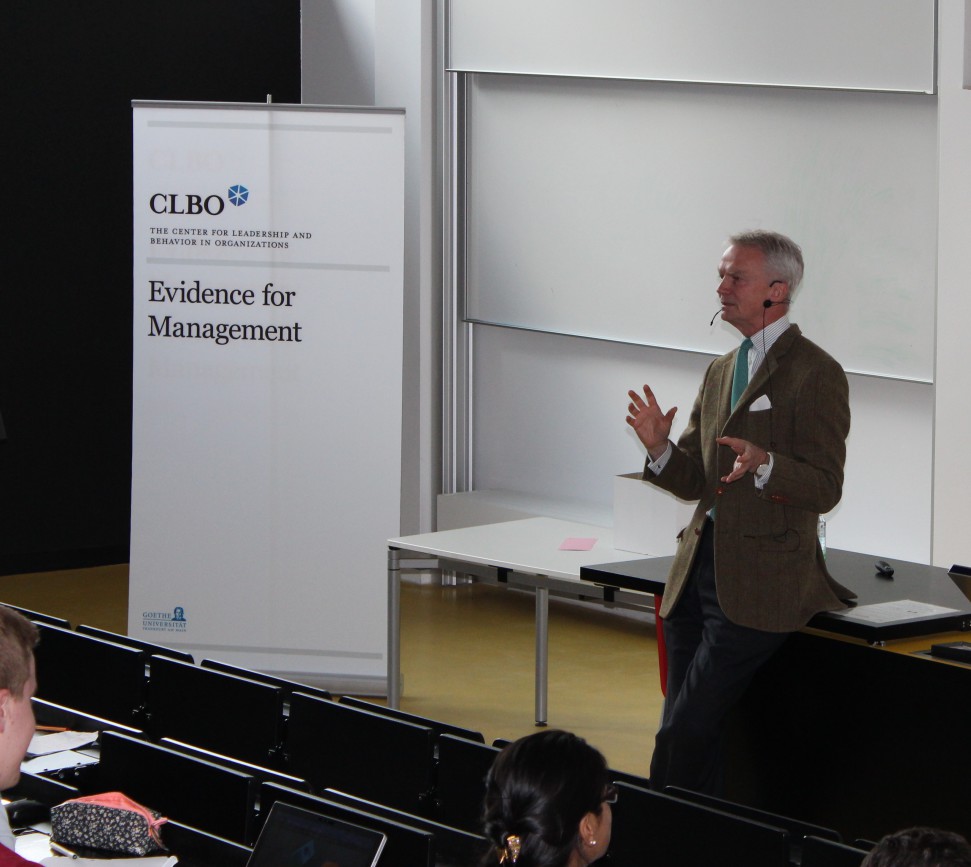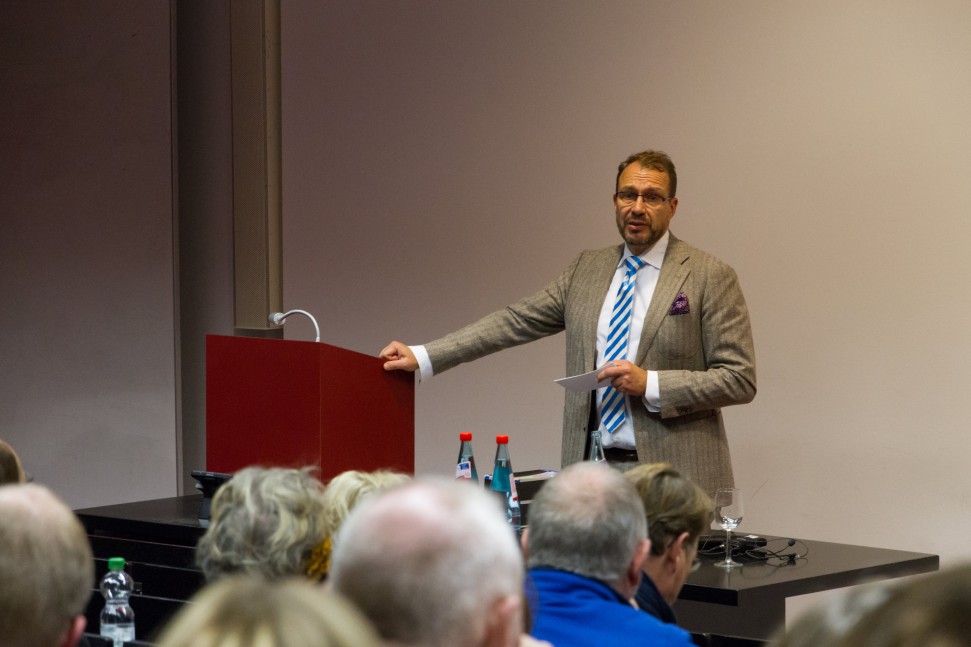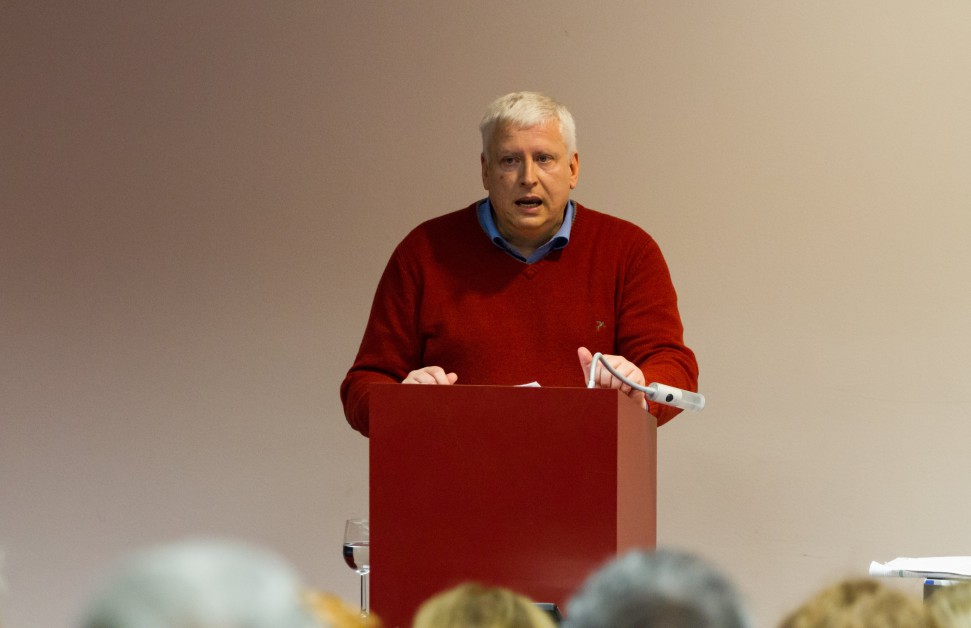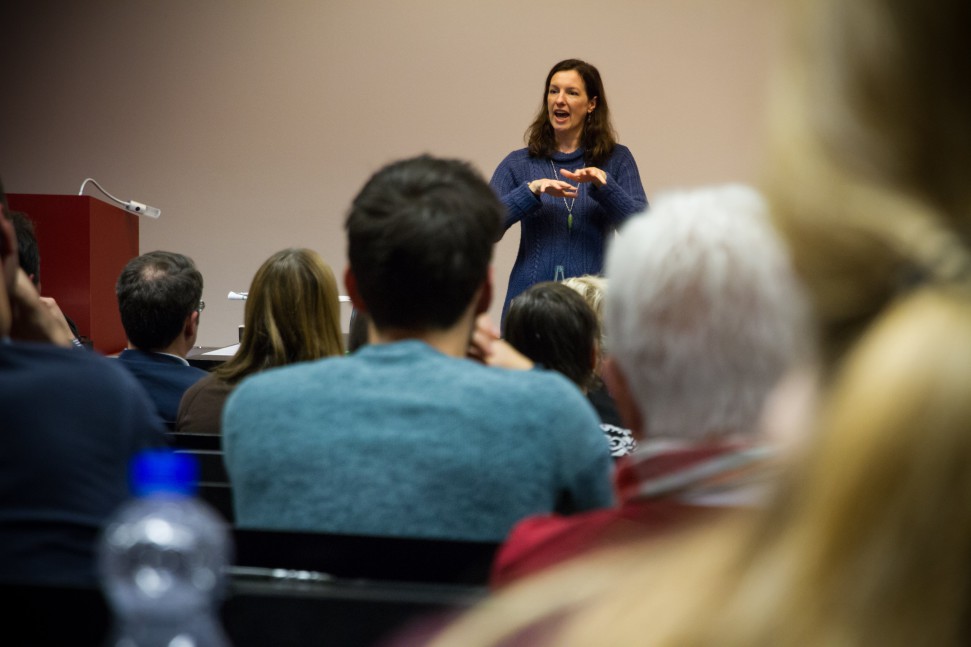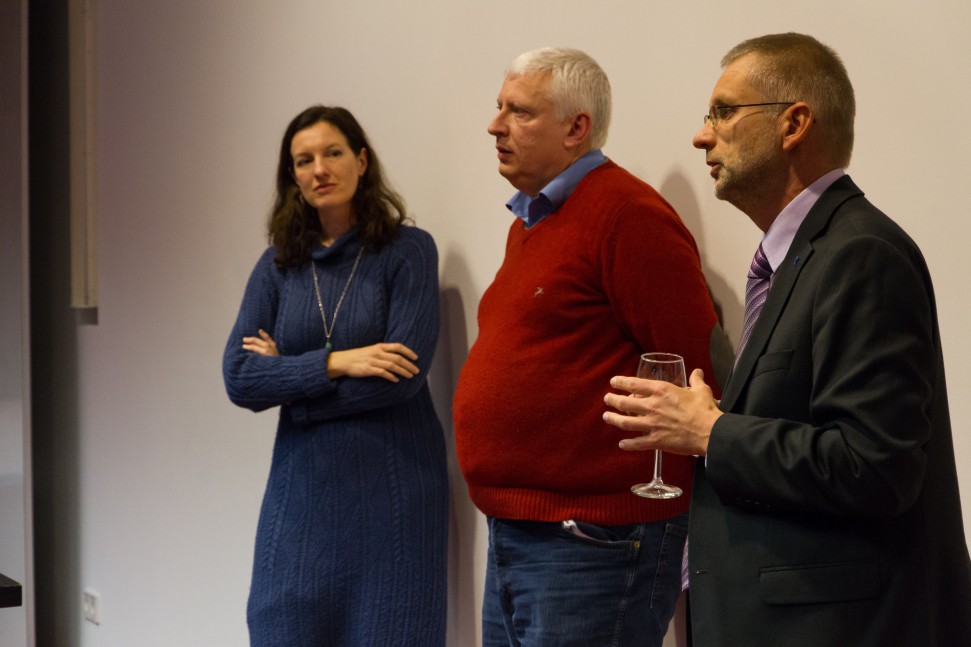News & Events
Events – Seite 2
Part of the lecture series titled “Ist die Welt schlecht? Is the world bad?”
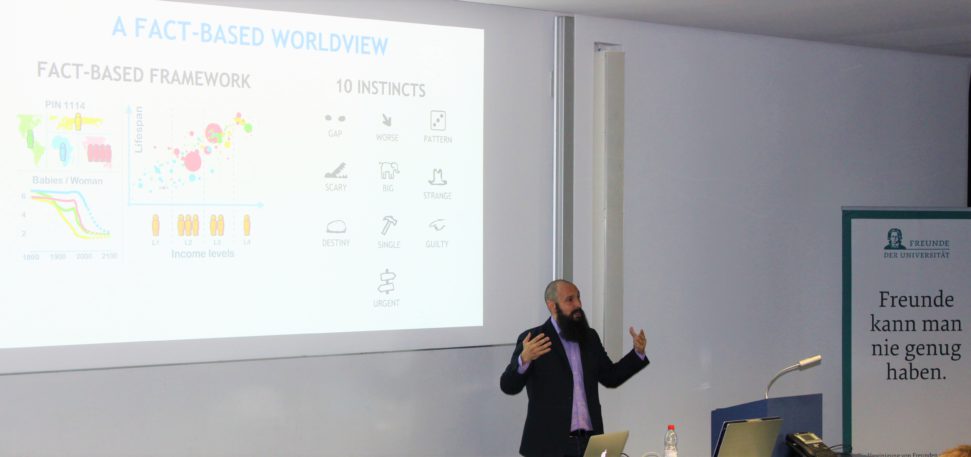 The lecture series titled “Ist die Welt schlecht?” continued with the second seminar carried out by the speaker Mikael Arevius. These lectures, organized by Prof. Rolf van Dick and funded by the association of Goethe University’s friends and supporters and the Grunelius Foundation, tried to provide a deeper insight into the progresses made by humans and into the world’s general condition. Its goal is to challenge the audience to think outside the box and to provide information in order to answer the main question: is the world bad?
Nowadays, we are misled into believing that, despite the technological progresses, the world is still governed by chaos and violence and it might seem that life on planet Earth is not better than it was in previous centuries. However, during his visit at the Goethe University Frankfurt, Mikael Arevius provided data to challenge this idea. Mikael Arevius started his career as a school teacher in Sweden. Subsequently, he expanded his knowledge in different areas, such as education and leadership. His experience and his inclination to create teaching tools and materials led him to collaborate with Gapminder. Gapminder is a Swedish foundation created by Hans Rosling, which provides statistical data from all over the globe. Gapminder, on the basis that there is a subtle ignorance regarding the facts of the world, aims to promote a greater awareness about global data, which are not always looked from the correct perspective.
The lecture series titled “Ist die Welt schlecht?” continued with the second seminar carried out by the speaker Mikael Arevius. These lectures, organized by Prof. Rolf van Dick and funded by the association of Goethe University’s friends and supporters and the Grunelius Foundation, tried to provide a deeper insight into the progresses made by humans and into the world’s general condition. Its goal is to challenge the audience to think outside the box and to provide information in order to answer the main question: is the world bad?
Nowadays, we are misled into believing that, despite the technological progresses, the world is still governed by chaos and violence and it might seem that life on planet Earth is not better than it was in previous centuries. However, during his visit at the Goethe University Frankfurt, Mikael Arevius provided data to challenge this idea. Mikael Arevius started his career as a school teacher in Sweden. Subsequently, he expanded his knowledge in different areas, such as education and leadership. His experience and his inclination to create teaching tools and materials led him to collaborate with Gapminder. Gapminder is a Swedish foundation created by Hans Rosling, which provides statistical data from all over the globe. Gapminder, on the basis that there is a subtle ignorance regarding the facts of the world, aims to promote a greater awareness about global data, which are not always looked from the correct perspective.
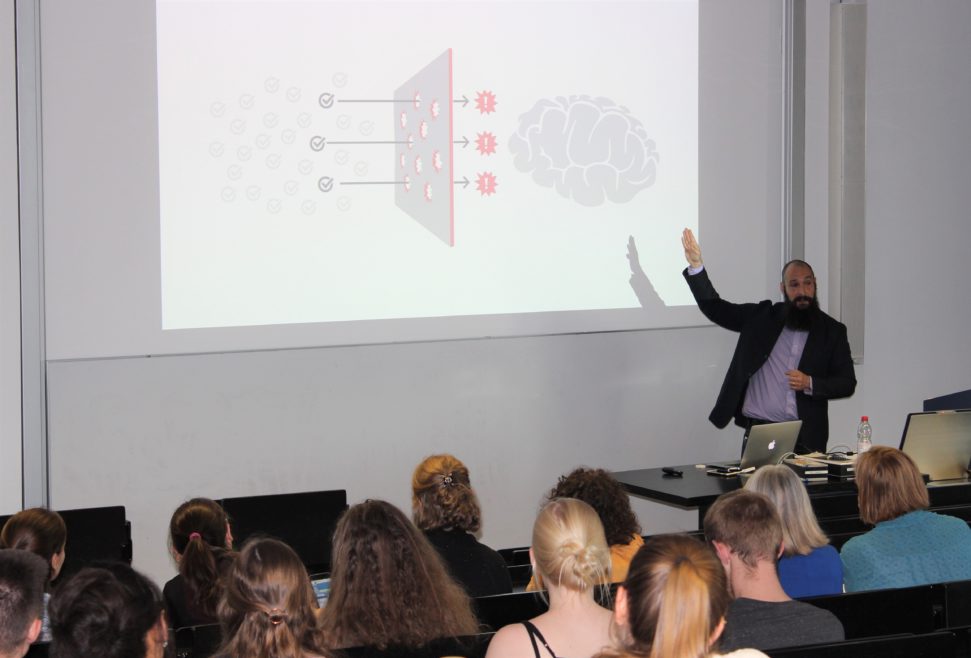 In the course of the lecture series “Is the world bad?”, Mikael Arevius visited the Goethe University Frankfurt. Besides a small group meeting, he gave a talk “For a fact-based worldview”. This lecture was interactive, indeed, the audience was asked to actively participate in the talk by answering a survey of four questions at the beginning of the lecture. The four questions were related to global facts and the total score of the audience was used by the speaker later in the talk to argument his ideas. After taking part in the survey, Mikael Arevius started the discussion highlighting how poorly people, normally, score in questionnaires like the one done at the beginning of the talk. In fact, people answering a 12-items questionnaire generally score less than 33%, which is, statistically speaking, the minimum percentage of correct responses if the answers were chosen randomly. The fact that people score less than 33% suggests that there is a shared ignorance regarding facts about the world.
Many examples were used to show to the audience the existence of a subtle ignorance about global facts. Furthermore, one striking illustration of the importance to look at trends and not just at the latest data was regarding the presence of women in politics. Nowadays, the percentage of women in political settings is about 23%, which is not a high percentage. However, Mikael Arevius showed that, compared to previous years, there was a significant growth of women in politics. The talk continued by showing interesting data about the general evolution of the world and its population. Remarkable was the use of teaching tools. Indeed, Mikael showed different animated bubble charts that aided the understanding and interpretation of statistical data. His material can also be found online, and it is free to the public.
In the course of the lecture series “Is the world bad?”, Mikael Arevius visited the Goethe University Frankfurt. Besides a small group meeting, he gave a talk “For a fact-based worldview”. This lecture was interactive, indeed, the audience was asked to actively participate in the talk by answering a survey of four questions at the beginning of the lecture. The four questions were related to global facts and the total score of the audience was used by the speaker later in the talk to argument his ideas. After taking part in the survey, Mikael Arevius started the discussion highlighting how poorly people, normally, score in questionnaires like the one done at the beginning of the talk. In fact, people answering a 12-items questionnaire generally score less than 33%, which is, statistically speaking, the minimum percentage of correct responses if the answers were chosen randomly. The fact that people score less than 33% suggests that there is a shared ignorance regarding facts about the world.
Many examples were used to show to the audience the existence of a subtle ignorance about global facts. Furthermore, one striking illustration of the importance to look at trends and not just at the latest data was regarding the presence of women in politics. Nowadays, the percentage of women in political settings is about 23%, which is not a high percentage. However, Mikael Arevius showed that, compared to previous years, there was a significant growth of women in politics. The talk continued by showing interesting data about the general evolution of the world and its population. Remarkable was the use of teaching tools. Indeed, Mikael showed different animated bubble charts that aided the understanding and interpretation of statistical data. His material can also be found online, and it is free to the public.
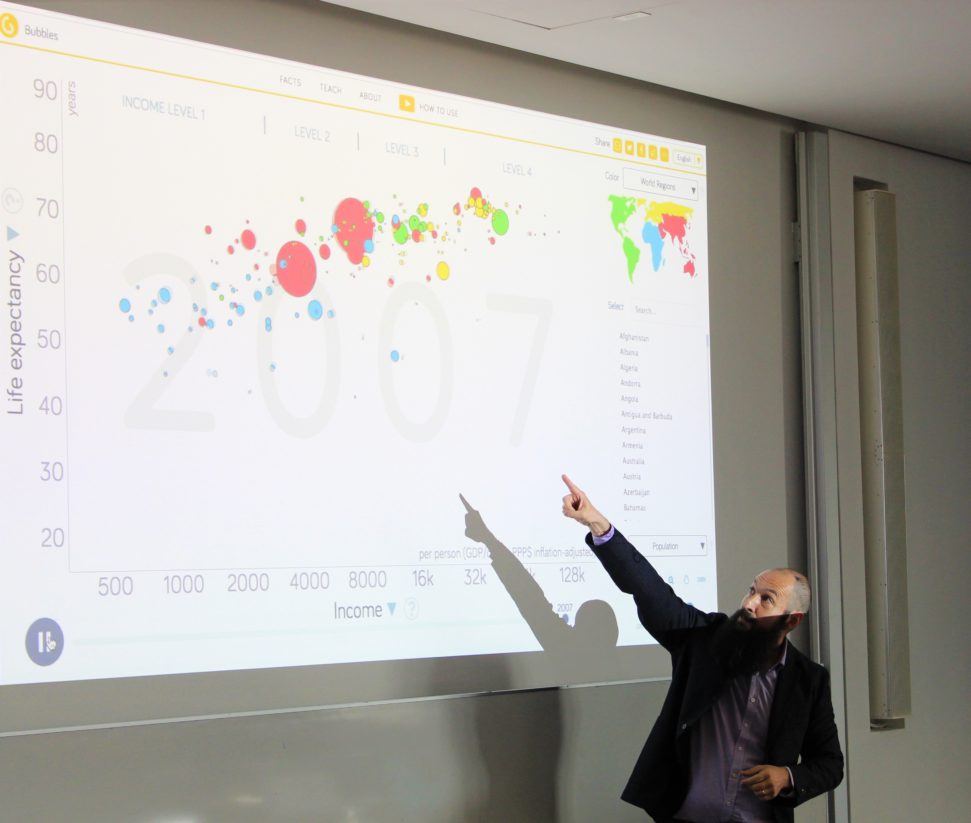 In conclusion, the talk by Mikael Arevius was very inspiring and gave a new insight into global data and their interpretation. His visit was part of a series of lectures on the future, which was donated by the association of friends and supporters of Goethe University to celebrate their 100-year anniversary and funded by the Grunelius foundation. Thus, this special gift to the university and the citizens of the city offered a wonderful opportunity to take a different look at the world.
In conclusion, the talk by Mikael Arevius was very inspiring and gave a new insight into global data and their interpretation. His visit was part of a series of lectures on the future, which was donated by the association of friends and supporters of Goethe University to celebrate their 100-year anniversary and funded by the Grunelius foundation. Thus, this special gift to the university and the citizens of the city offered a wonderful opportunity to take a different look at the world.
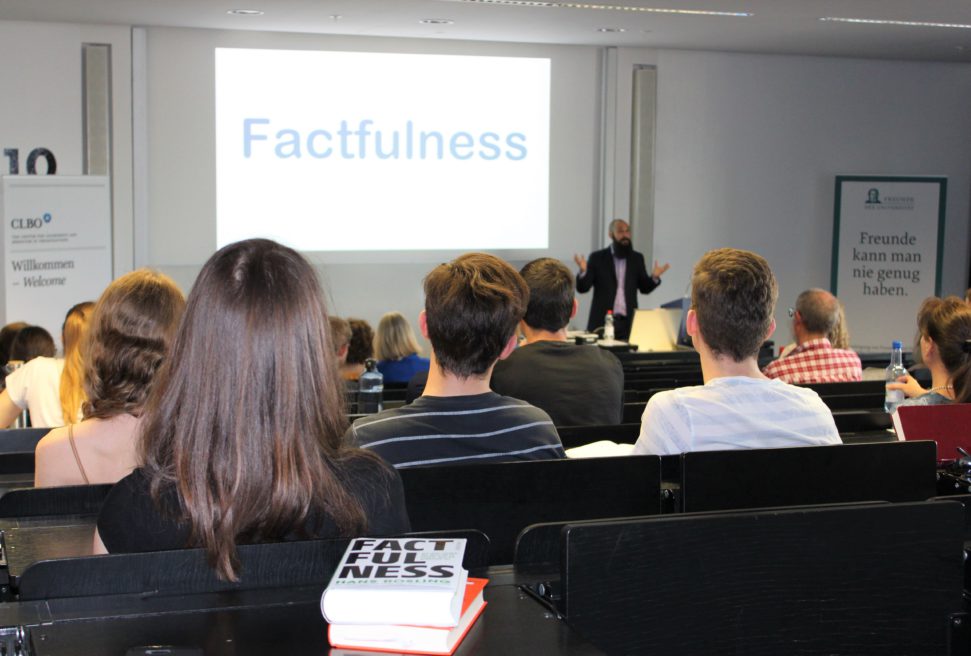
Start of the lecture series “Ist die Welt schlecht? Is the world bad?”
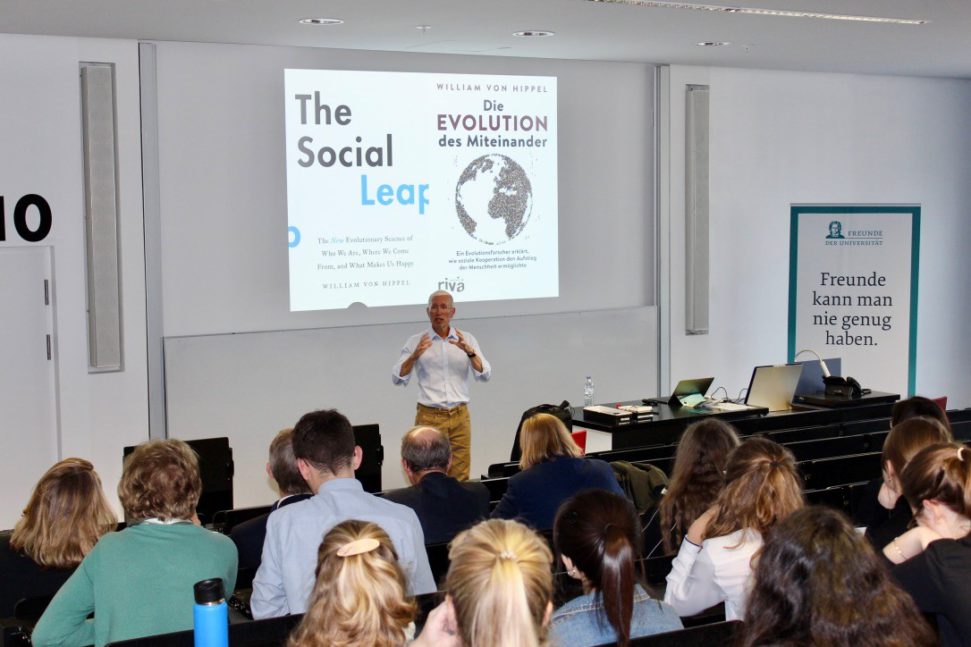 „Is the world bad?“ is the main question within the lecture series organized by Prof. Rolf van Dick with the contribution of friends and supporters of Goethe University and funded by the Grunelius Foundation. When we watch the news, read the newspaper or screen the social media, we are confronted with disasters, crises and terrorism. And this can easily lead to the impression that the world is getting worse and worse and that everything was better in the past. However, a lot has changed to the better over the past years. The aim of this lecture series is to put things into perspective and to look at the positive side and at the advancements that we have made in the past years.
The start of the lecture series was made by Prof. William von Hippel, who visited the Goethe University from May 20th to 22nd. During his permanence in Frankfurt, he gave a talk about „The social leap“, from which he offered some ideas to answer the important question: „ Is the world bad?“. Prof. William von Hippel received his PhD in social psychology at the University of Michigan. He then was an assistant and associate professorship at Ohio State University. Currently, he is Professor of Psychology at the University of Queensland in Brisbane, Australia. His research interests include evolutionary psychology, executive functioning and social competences.
„Is the world bad?“ is the main question within the lecture series organized by Prof. Rolf van Dick with the contribution of friends and supporters of Goethe University and funded by the Grunelius Foundation. When we watch the news, read the newspaper or screen the social media, we are confronted with disasters, crises and terrorism. And this can easily lead to the impression that the world is getting worse and worse and that everything was better in the past. However, a lot has changed to the better over the past years. The aim of this lecture series is to put things into perspective and to look at the positive side and at the advancements that we have made in the past years.
The start of the lecture series was made by Prof. William von Hippel, who visited the Goethe University from May 20th to 22nd. During his permanence in Frankfurt, he gave a talk about „The social leap“, from which he offered some ideas to answer the important question: „ Is the world bad?“. Prof. William von Hippel received his PhD in social psychology at the University of Michigan. He then was an assistant and associate professorship at Ohio State University. Currently, he is Professor of Psychology at the University of Queensland in Brisbane, Australia. His research interests include evolutionary psychology, executive functioning and social competences.
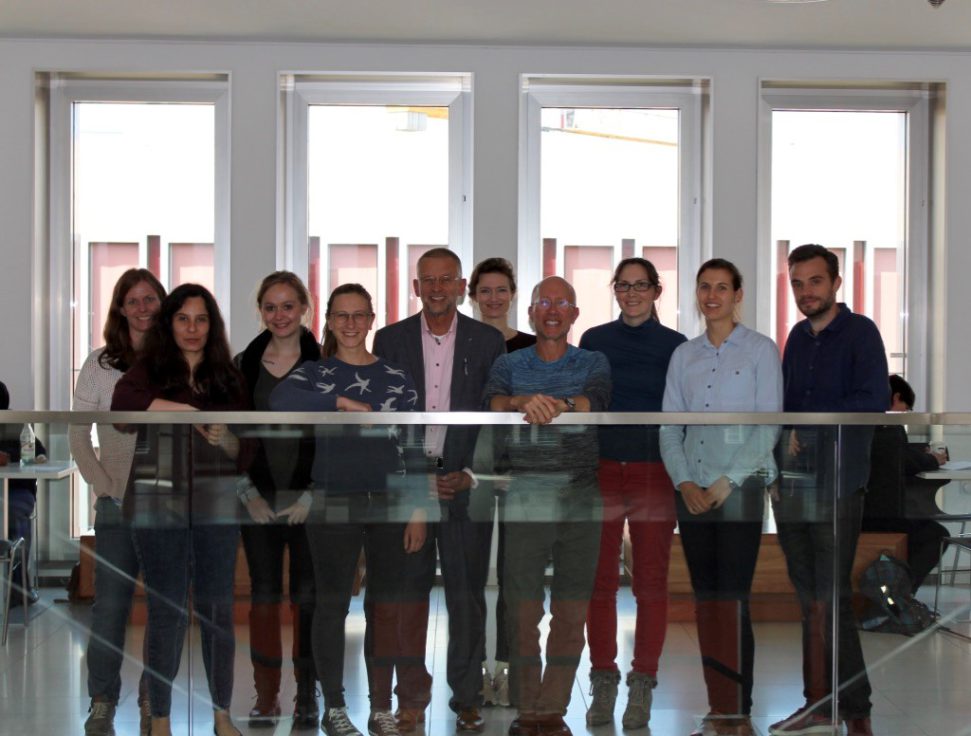 During his stay, Prof. William von Hippel met up with PhD students, postdocs and professors from different departments of the Goethe University. For example, he discussed research questions with members of the Department of Psychology, had meetings with members of the Faculty of Economics and Business Administration and exchanged ideas with members of the Department of Management and Microeconomics. Besides personal meetings, several small group meetings took place like a stimulating discussion with the interdisciplinary collaborative network “Resilience Factors in a diachronic and intercultural perspective” where researchers from archaeology, psychology and life sciences examine which factors enable individuals, smaller or larger collectives to cope with stressful situation in the past.
The highlight of his visit at the Goethe University was his talk about “The social leap”. He began his talk from the evolution of our distant ancestors that encouraged a “social leap” from the rainforest to the savannah. Indeed, they prioritized teamwork over physical competences in their struggle for survival, creating a new form of social intelligence that shaped humanity’s way from the apex predator. He then built a bridge between our evolutionary history over the last 6 million years and some of the fundamental aspects of our lives today. For example, he highlighted how cooperation and kindness make us more effective killers, indicating that this can be seen both as a threat and as an opportunity. In addition, he theorized how for example with the aid of modern medicine and knowledge about the environment, the world got cleaner and safer and people became healthier and older. He concluded his inspiring talk with possible explanations about the reasons why people are not so much happier even though the world has progressively become better.
Altogether, it was an interesting and inspiring visit and a great start for the lecture series which was made possible by the association of Goethe University’s friends and supporters and the Grunelius Foundation who supported this lecture series - without their financial support this event would not have been possible. Many contacts were made and collaborations were planned for further projects. Prof. William von Hippel concluded that he had enjoyed his stay in Frankfurt very much and that he would like to come back during his sabbatical next year.
During his stay, Prof. William von Hippel met up with PhD students, postdocs and professors from different departments of the Goethe University. For example, he discussed research questions with members of the Department of Psychology, had meetings with members of the Faculty of Economics and Business Administration and exchanged ideas with members of the Department of Management and Microeconomics. Besides personal meetings, several small group meetings took place like a stimulating discussion with the interdisciplinary collaborative network “Resilience Factors in a diachronic and intercultural perspective” where researchers from archaeology, psychology and life sciences examine which factors enable individuals, smaller or larger collectives to cope with stressful situation in the past.
The highlight of his visit at the Goethe University was his talk about “The social leap”. He began his talk from the evolution of our distant ancestors that encouraged a “social leap” from the rainforest to the savannah. Indeed, they prioritized teamwork over physical competences in their struggle for survival, creating a new form of social intelligence that shaped humanity’s way from the apex predator. He then built a bridge between our evolutionary history over the last 6 million years and some of the fundamental aspects of our lives today. For example, he highlighted how cooperation and kindness make us more effective killers, indicating that this can be seen both as a threat and as an opportunity. In addition, he theorized how for example with the aid of modern medicine and knowledge about the environment, the world got cleaner and safer and people became healthier and older. He concluded his inspiring talk with possible explanations about the reasons why people are not so much happier even though the world has progressively become better.
Altogether, it was an interesting and inspiring visit and a great start for the lecture series which was made possible by the association of Goethe University’s friends and supporters and the Grunelius Foundation who supported this lecture series - without their financial support this event would not have been possible. Many contacts were made and collaborations were planned for further projects. Prof. William von Hippel concluded that he had enjoyed his stay in Frankfurt very much and that he would like to come back during his sabbatical next year.
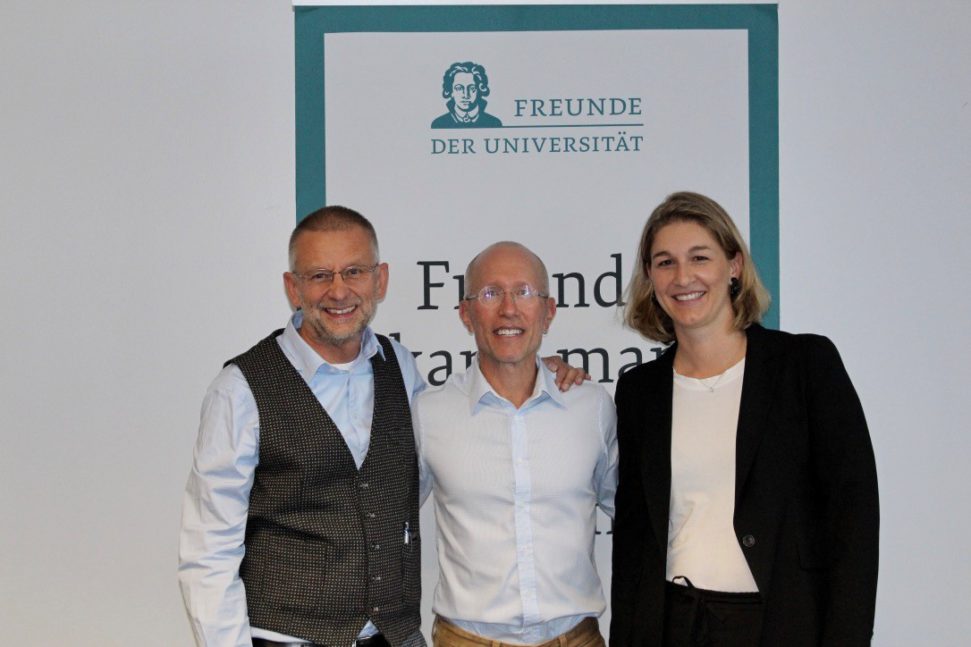
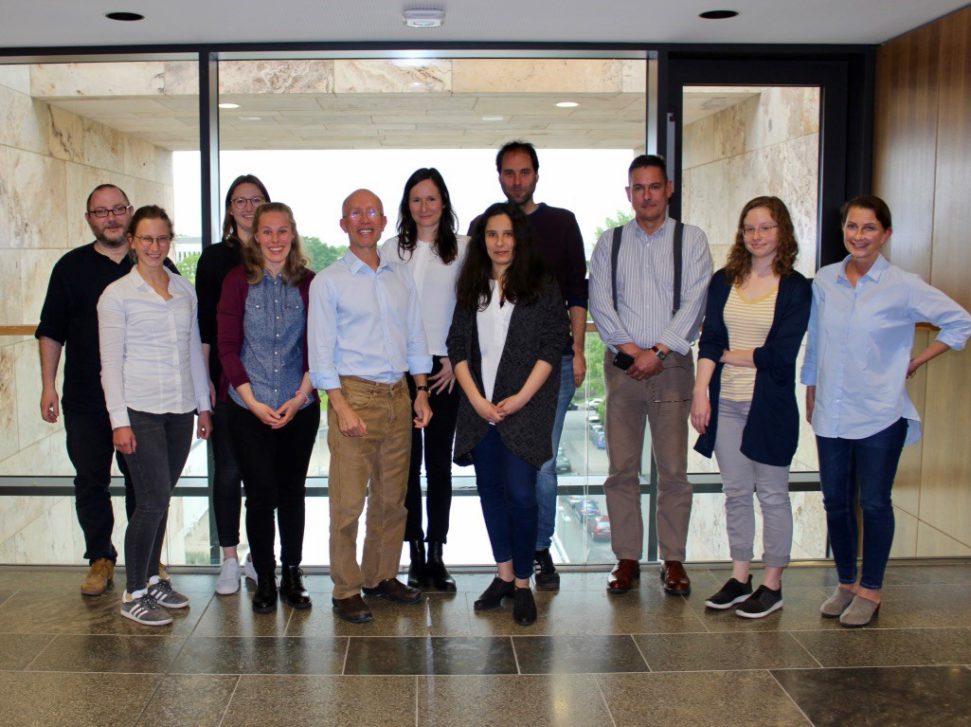
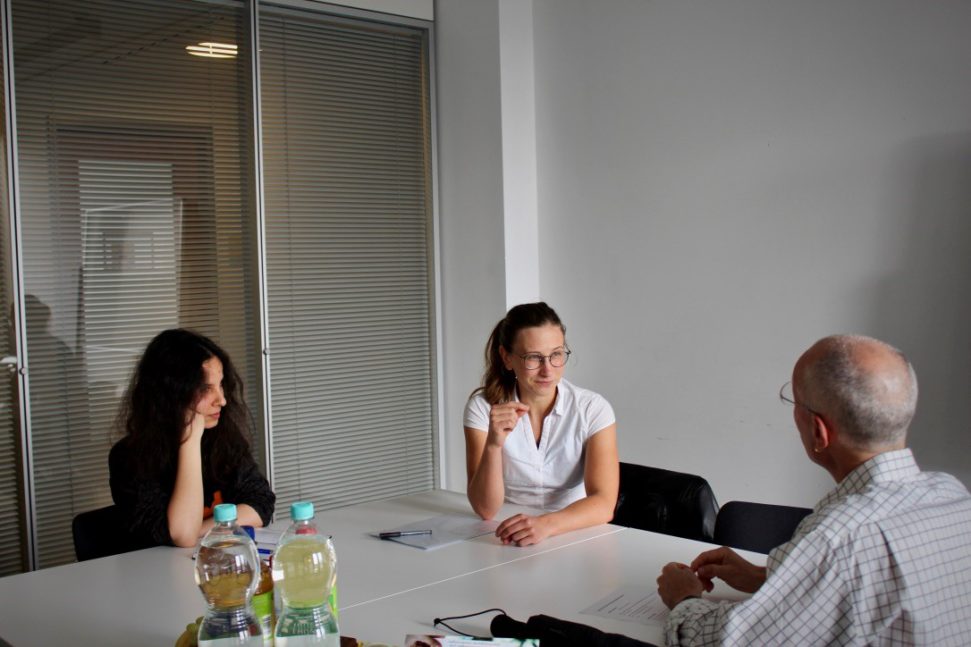
1. 5. 2019 Vortragsreihe „Ist die Welt schlecht?“
Katastrophen, Krisen, Unfälle und Terrorismus – schlägt man die Zeitung auf, schaut Nachrichten oder surft im Internet und in den „sozialen Medien”, könnte man den Eindruck bekommen, dass wir heute in einer schlechten Welt leben und dass alles immer schlimmer wird. Über negative Ereignisse zu berichten ist eine wichtige Aufgabe der Medien. Aber ist die Welt wirklich voll von Problemen, Bedrohungen und Ungleichheit? In den vergangenen Jahren hat eine Reihe von Wissenschaftlerinnen und Wissenschaftlern ganz unterschiedlicher Disziplinen sich dieser Frage gewidmet. Sie alle zeigen: Der Menschheit insgesamt geht es in ihrer über zwei Millionen Jahre alten Entwicklungsgeschichte so gut wie nie zuvor. Wir leben also gesünder, länger, friedlicher und wohlhabender als je zuvor, haben aber den Eindruck, dass alles immer schlimmer wird. Wie kommt es zu diesen verzerrten Wahrnehmungen? Wie sieht die Faktenlage tatsächlich aus? Diesen und weiteren Fragen widmet sich die Vortragsreihe. Im Rahmen von zwei Gastvorträgen laden wir Sie ein, sich mit den globalen Entwicklungen der letzten Jahrhunderte auseinanderzusetzen und gemeinsam mit uns die Fakten und Mythen zu entdecken und zu diskutieren. Im Rahmen dieser Vortragsreihe wird Prof. William von Hippel am 21.05.2019 einen Vortrag zum Thema „The social leap“ halten. Am 04.06.2019 wird Mikael Arevius von der Gapminder Foundation einen Vortrag zum Thema „For a fact-based worldview“ halten. Die Vorträge finden jeweils um 18:30 Uhr im Hörsaal 10 im Hörsaalzentrum auf dem Campus Westend der Goethe Universität Frankfurt statt. Weitere Informationen zu der Vortragsreihe und den Vorträgen finden Sie hier.
10. 5. 2017 CLBO-Veranstaltung: „Der Aufsichtsrat als Team“
Dr. Florian Schilling (Partner, Board Consultants International) berät Unternehmen nicht nur bei der Suche von Aufsichtsgremien, sondern führt auch Effizienzprüfungen durch. In seinem Vortrag am vergangenen Dienstag, 09. Mai 2017, bot der Experte einen Einblick in das Innenleben von Aufsichtsräten und erläuterte, wie die Zusammenarbeit in Aufsichtsgremien verbessert werden kann. In dem daran anschließenden Dialog zwischen dem Vortragenden und dem Publikum wurde dieses interessante Thema aus verschiedenen Perspektiven diskutiert.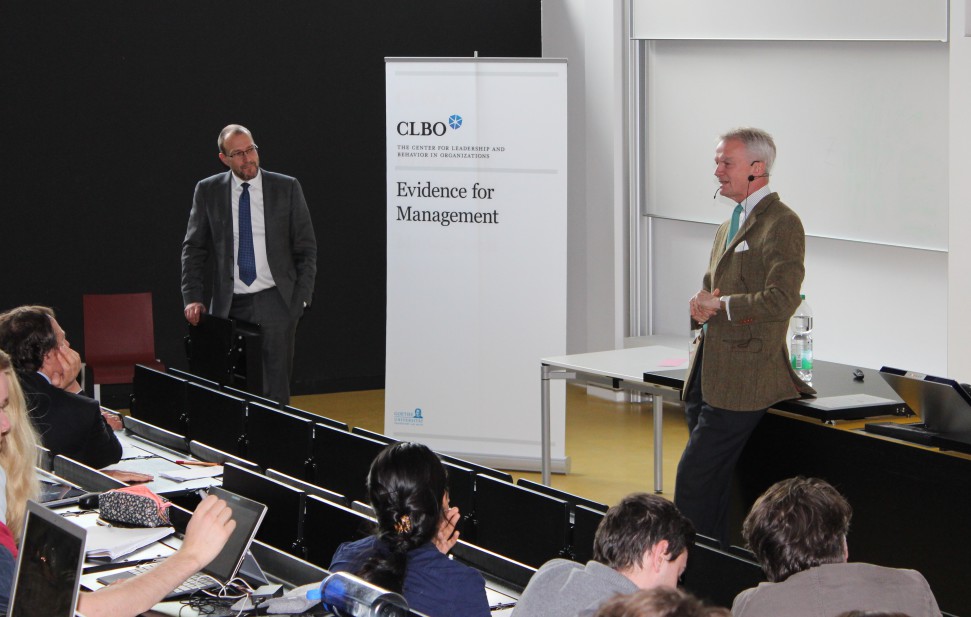
Weitere Informationen finden Sie auch auf seiner Homepage. Die Vortragsfolien können Sie hier herunter laden.
9. 3. 2017 Lunchtalk “Strengthening Women Career Networks – A Transatlantic Exchange of Best Practices“
Despite the loud clamoring many companies are making about equality and diversity, women are still underrepresented in managerial and executive roles and do not receive equal pay. Nonetheless, women are increasingly strategic about building and leveraging their networks for career success. The results are lasting relationships that can be the building blocks for future job placements. This Lunchtalk is moderated by CLBO Director Heather Hofmeister, Professor for the Sociology of Work at Goethe-University in Frankfurt. Speakers are Melissa Fisher, Cultural Anthropologist and professor at New York University, Paula Landes, Head and Founder of Digital Media Women e.V. Rhein-Main, and Nicole Beste-Fopma, Member of the Board of Business and Professional Women Germany (BPW). When: March 16, 2017 Time: 13:00 – 15:00 Where: U.S. Consulate General Frankfurt, Entrance: Wetzlarer Straße, 60435 Frankfurt am Main Registration is required! To register, please send an email to FrankfurtPAReservation@state.gov by Monday, March 13.
10. 11. 2016 CLBO-Veranstaltung: Where Do You Think You Are Going? Die USA vor der Wahl – Vortrag und Diskussion
“It was great, just great. Believe me.“ Schockierende Zahlen über die Arbeitslosenquote in Amerika, eine eindrucksvolle Analyse der amerikanischen (Wahl-) Geschichte, ein echter amerikanischer Stimmzettel und interessante Diskussionen über die Neigung zum Autoritarismus. Die Veranstaltung des Centers for Leadership and Behavior in Organizations (CLBO) am Vorabend der Wahl lieferte spannende Einblicke in die amerikanische Präsidentschaftswahl aus unterschiedlichsten Blickwinkeln.
Wie kommt es, dass ein Kandidat mit Hilfe populistischer Äußerungen und Provokationen nicht nur die republikanischen Vorwahlen gewinnen konnte, sondern auch weiterhin aussichtsreich im Rennen um die Präsidentschaft liegt? Ist der derzeitige amerikanische Wahlkampf wirklich so einmalig „dirty“? Und wie könnte es nach der Präsidentschaftswahl weitergehen? Diese und andere Fragen wurden am vergangenen Montagabend im Rahmen der CLBO-Veranstaltung diskutiert – moderiert durch den bekannten Journalisten und Fernsehkolumnisten Achim Winter.Professor Guido Friebel eröffnete die Veranstaltung mit zum Nachdenken anregenden Zahlen über die wirtschaftliche Lage der USA: Rund 7 Millionen amerikanische Männer sind komplett vom Arbeitsmarkt ausgeschlossen – sie bekommen keine Arbeitslosenunterstützung und suchen nicht einmal mehr nach einer Arbeitsstelle. In einer brillianten Analyse erläuterte Professor Michael Hochgeschwender vom Amerika-Institut der LMU München vor dem Hintergrund der amerikanischen Geschichte das „Phänomen Trump“. Insbesondere zeigte der Amerika-Experte die Wurzeln des Populismus in den Vereinigten den Staaten auf, die er bis zurück in das frühe 19. Jahrhundert verfolgte und auf die Präsidenten Jefferson und Jackson und die Spannung zwischen weltoffenen Stadtbewohnern und der Landbevölkerung zurückführte. Ein Abriss der amerikanischen (Wahl-) Geschichte verdeutlichte, dass der Wahlkampf in Amerika schon immer eine intensive und oft auch gewalttätige Angelegenheit war. Besondere Aufmerksamkeit erregte seine These, dass die Republikanische Partei aufgrund ihrer "Grass Root” Kultur massiven internen Polarisierungstendenzen unterliegt, die in näherer Zukunft schwerlich beherrschbar scheinen.
Das Gefühl zu kurz zu kommen, was vor allem viele weiße männliche US-Bürger haben, beschrieb die Soziologin Professor Heather Hofmeister sehr eindrucksvoll mit dem Bild der Warteschlange: Während sie selber geduldig in der Schlange warteten, würden sich vor ihnen immer wieder andere Menschen vordrängeln – Immigranten, Frauen, Schwarze – und würden von der Regierung auch noch gutmütig nach vorne gewunken. Der Sozialpsychologe Professor Rolf van Dick ging abschließend auf das Konzept Autoritarismus ein und erläuterte, welche Ursprünge dies hat, welche Merkmale es beinhaltet und auch welche (langfristigen) Änderungsmöglichkeiten bestehen. In dem daran anschließenden Dialog zwischen Vortragenden und Publikum wurde die bevorstehende Präsidentschaftswahl aus geschichtlichen, soziologischen, wirtschaftswissenschaftlichen und psychologischen Blickwinkeln diskutiert. Das Center for Leadership and Behavior in Organizations (CLBO) unterstützt den interdisziplinären Austausch zu verschiedenen Themen und zeigte mit der Veranstaltung, dass solch ein komplexes Phänomen wie die amerikanische Präsidentschaftswahl am ehesten aus verschiedenen Perspektiven verstanden werden kann.
